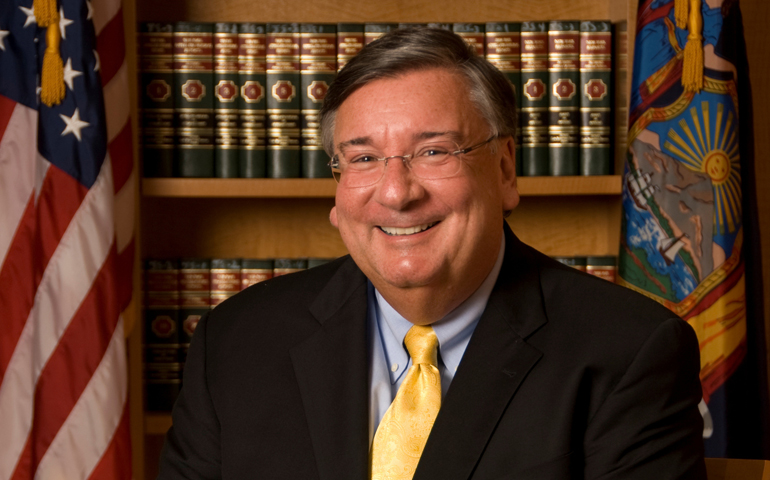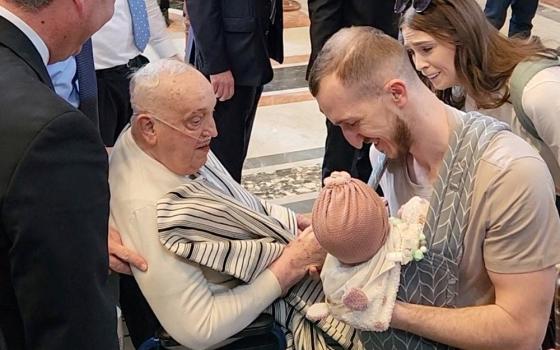
Matthew D'Emic, presiding judge of Brooklyn Mental Health Court and Brooklyn Domestic Violence Court
Matthew J. D'Emic is a New York state judge assigned to the Kings County Supreme Court, the state's felony-level trial court. He has presided over the Brooklyn Domestic Violence Court since 1997 and the Brooklyn Mental Health Court since 2002, and has been recognized for his work in domestic violence by the Justice Department, the Brooklyn Women's Bar Association and the Lawyers Committee against Domestic Violence. His work in mental health has been acknowledged by the New York State Psychiatric Association and the National Alliance on Mental Illness, among others.
While outsiders pay tribute to his successes, D'Emic, 59, is very much aware of his losses. Symbolic of these is the suicide of a 24-year-old man whose funeral D'Emic attended and whose story he shared in an essay titled "Requiem for Rene: a suicide lament."
What caused you to feel so deeply about this death?
Although the Brooklyn Mental Health Court can boast more than 500 successful graduates, Rene was not one of them. In fact, there have been other suicides. I didn't anticipate any of them. Unlike the cancer patient who gives up on treatment because the physical pain is too much to bear, the suffering of the patient with mental illness is concealed and misunderstood.
What were the circumstances that brought this man to your court?
To answer this question, I first have to tell you about mental health courts. These are sometimes called problem-solving courts that operate under principles of "therapeutic jurisprudence," seeking to use the authority of the court for the physical and psychiatric benefit of those appearing before it. The Brooklyn Mental Health Court is an alternative to incarceration court. Its goal is to keep criminally accused persons suffering from mental illness out of jail and in treatment. Think of it as a second-chance court for these people.
Rene, accused of assault, came to the court as a defendant. He was evaluated by a psychiatrist and social worker. Since he suffered from a serious and persistent mental illness, he was eligible for diversion to the court. He then, like most mental health court defendants, entered a guilty plea with his sentence deferred. If he successfully completed the court's treatment mandate, his felony plea would have been vacated and Rene would have been sentenced to misdemeanor probation. In less violent cases, a defendant can look forward to a complete dismissal of all charges.
What do you remember about that first meeting?
As he appeared before me with his attorney, my attention was drawn to the bizarre tattoos of celestial bodies that dotted his face and arms.
What had he done?
He had assaulted his grandmother's neighbor with a knife, a serious charge. A social worker and psychiatrist working with the court diagnosed Rene with bipolar type schizoaffective disorder.
How does that manifest itself?
His illness was characterized by extreme episodes, as the doctor explained, ranging from depressed, inert and suicidal lows to hyperactive, wild, grandiose highs, to unbridled rage, lasting anywhere from hours to months. All of this was complicated by self-medication and with marijuana and alcohol. The onset of the disease came at age 19, requiring six hospitalizations, an assertive community treatment team and assisted outpatient treatment order by another judge, all before he got to me on the criminal charge. As our doctor sadly wrote, the disease "thoroughly disabled him since his late teens."
How did he do?
In the next six months, Rene appeared before me 27 times. I saw him do poorly, then well. He missed and kept appointments. Eventually he committed suicide, leaving a note that he could no longer live with mental illness.
You joined Rene's family at his funeral Mass in St. Matthias Church in Ridgewood. How did this service meet the needs of the mourners?
The funeral rites of the Catholic church are rich in majesty and mystery. The Mass, resplendent with the priest's white vestments, a blessing with holy water and prayers to the saints and angels for the speedy deliverance of the departed's soul to the throne of God, is comforting and cathartic: The pungent odor of incense rising as a symbol of the mourners' prayers is powerful. It's a liturgy that seeks to explain the secret of life's suffering. It looks to alleviate the distress of the terrible finality of death, if just for an hour, recalling the scriptural promises of eternal life. The child's life is changed, not ended. He is in the arms of a welcoming and loving God. Free of illness. Free of pain.
You know, Matt, this isn't the way I usually conduct these conversations, but your description of this funeral is what made me decide to invite your participation in this forum. Your description of the funeral says much about your own faith, your appreciation of the gifts of our church. With whom and what do you credit your faith formation?
My own faith is a work in progress. Of course, I had great examples in my parents, grandparents, aunts and uncles. My earliest remembrance of a faith experience is a strange one. My mother had a children's book of Old Testament stories. It was beautifully illustrated and simply written. Even as a preschooler I devoured the book and took every page on faith. Its impact was so great that I clearly remember sitting and reading it in the living room for long periods. Whatever good I am able to do is also a credit to the Sisters of Charity, Franciscan Brothers and Xaverian Brothers who taught me in grammar school and high school, and my teachers at Fordham.
What was your birth family like?
Well, I have six brothers and three sisters. With my parents, that makes 12 people living in one small house. I slept in a room with three of my brothers. We are all still close, and eight of us live within a few blocks. Of course, growing up in a family that large is a whole different experience with a lot of challenges. My father's sudden death at age 52 added to these challenges. Things were always interesting. I also believe it gave me an ease at interaction with many different personalities. That helps me do my job today.
Did you have role models?
This may seem a little odd, but two of my greatest role models were my mother's sisters. They were single and had no children. My Aunt Betty, whom you knew as Sister Mary Joan, was a Sister of Mercy, and my Aunt Sis was an executive at General Motors. Both were brilliant, accomplished, compassionate, joyful women of faith. Each of them also had a special relationship not just with me but with all 38 of their nieces and nephews. They taught me a lot about God's love -- and modeled it. My mother, as well, went back to college with my kid brothers after my father died and then started working. Pretty remarkable for a woman who raised 10 children.
In our phone conversation, you mentioned welcoming your children and grandchildren into your home while awaiting repairs necessitated by Sandy, the storm that battered our area. Would you say something about them?
My greatest accomplishment is my children. Each is a good person with a kind heart and helping disposition. Drew is an FDNY lieutenant and is raising two bright and beautiful kids, Reece, who will be 9 soon, and Drew Jr., who is 7. Matt is a lawyer, and Kate teaches special education. Since Drew, his wife, Ann, and the kids have been staying with me because of the hurricane, Kate has taken the kids to her school with her, and both she and Matt have helped my wife, Rosemary, with babysitting. They will probably be with us for a month or two, and I know I'll miss them when they're able to go back home.
Why did you did you become a lawyer, then a judge?
I suppose I became a lawyer in part to fulfill some unspoken expectation as a second-generation American. I also thought it would be a good grounding for a political career that ended when I lost an election to the state assembly. I was always attracted to public service, and since I had little hope of an executive or legislative position, I began thinking of the judiciary. I am lucky in that my assignments have been interesting, first hearing domestic violence cases then adding the mental health court. I am fortunate since both assignments allow me to positively impact individuals and society. I was just appointed an adjunct professor at Brooklyn Law School, my alma mater, and enjoy sharing my experiences with a new generation of lawyers.
I know you serve on Mercy Home's board of directors, as do I. What attracted you to that agency?
As you know, sister, Mercy Home serves the developmentally disabled. That is enough to attract me. If you add the fact that Sister Mary dePorres, another person who taught me a lot about God's love, asked me to serve on the board, then you have a complete picture of why I am there.
Although your court handles much that is dysfunctional and tragic, when I think of you in private life, I see a man wearing a big smile. In fact, the Wall Street Journal once described your judgeship as "a mixture of humor and schoolmaster sternness." And I've seen the humorous dimension when you turn into a whippoorwill. Would you say something about that?
Well, sister, I have handled many murder cases in the domestic violence part and have seen much suffering. In the mental health court, as well, I get to witness the stigma attached to mental illness. Despite this evil, I can still see hope breaking down despair every day in court. I suppose my humor helps me, and I hope in some way lessens the burden of those families sitting in court affected by violence or sickness.
As for my classic rock band, Whippoorwill, we got back together about two years ago. I have known my two band mates, Paul Cassone and John Lepore, for 40 years or so. We played together when I was in law school. They are wonderful friends, good people and great musicians. So it is clearly a joy to play with them.
You've managed to balance a great deal in your own life. What do you wish for your children and grandchildren?
The usual gifts of long, fruitful, happy lives, as pain-free as possible. I would be disappointed, however, if they stopped being the thoughtful, considerate people I have watched them grow up to be.
What strength do you draw from your faith?
I think the humor we spoke of earlier is a reflection of my faith. My faith also informs every aspect of my life. Dietrich Bonhoeffer remarked, "Christians are called to compassion and action." I hope I can live up to that, and to temper ego and ambition with Dante's wisdom that "the most righteous requests are answered in the silence of the deed."
Is there anything you would change in contemporary Catholicism?
I just finished reading the great rocker Dion DiMucci's book on his faith. He recounts how James Joyce described the Catholic church as "Here Comes Everybody." Dion thinks of our church as a hospital for sinners, not a hotel for saints. I love those descriptions.
Is there anything you wish I had asked?
Not that I can think of.
Well, Matt, I thank you for your generous sharing.
[Mercy Sr. Camille D'Arienzo, broadcaster and author, narrates Stories of Forgiveness, a book about people whose experiences have caused them to consider the possibilities of extending or accepting forgiveness. The audio book is available through the book's website, storiesofforgiveness.com.]
Editor's note: We can send you an email alert every time Sr. Camille's column, "Conversations with Sr. Camille," is posted. Go to this page and follow directions: Email alert sign-up.




